Best Consultancy in Nepal for Germany
Visit NIEC, Your Trusted Partner for Studying in Germany.

Overview
Complete guide to studying in the Germany for Nepalese students
Germany is a highly attractive destination for international students seeking high-quality education, diverse programs, and unique cultural experiences. Germany is home to some of the world’s top-ranked universities and research institutions. One of the most significant advantages of studying in Germany is its low tuition fees, especially at public universities. Many public universities charge no tuition fees or nominal administrative fees, even for international students. This makes education accessible to a broad range of students.
Germany is renowned for its emphasis on research and innovation. Students have access to state-of-the-art facilities and opportunities to engage in cutting-edge research across various fields. International students in Germany are allowed to work part-time during their studies (up to 20 hours per week) and full-time during semester breaks. After graduation, there are opportunities to stay and work in Germany through post-study work visas and other schemes.
Germany is a melting pot of cultures, with a diverse population and thriving international communities in major cities. Studying in Germany offers exposure to different cultures, languages, and perspectives.While many programs are offered in English, learning German can enhance your overall experience and open up additional opportunities for employment and integration into German society.
Overall, Germany provides an enriching and rewarding experience for international students, combining academic excellence, cultural diversity, and a high quality of life. Whether you’re pursuing undergraduate, graduate, or research studies, Germany offers ample opportunities for personal and academic growth. Visit NIEC, one of the best consultancy in Nepal for study in Germany.
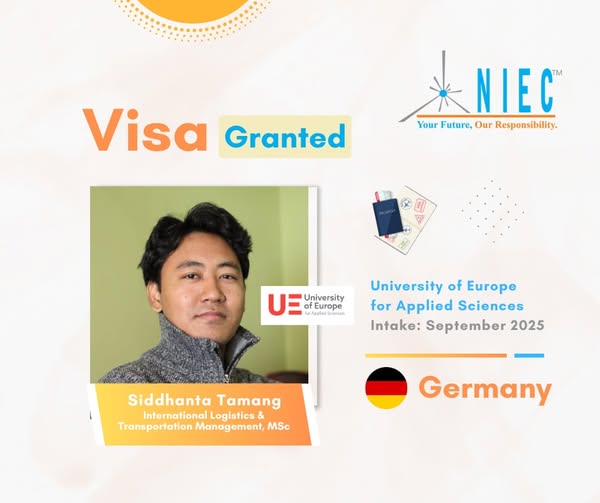
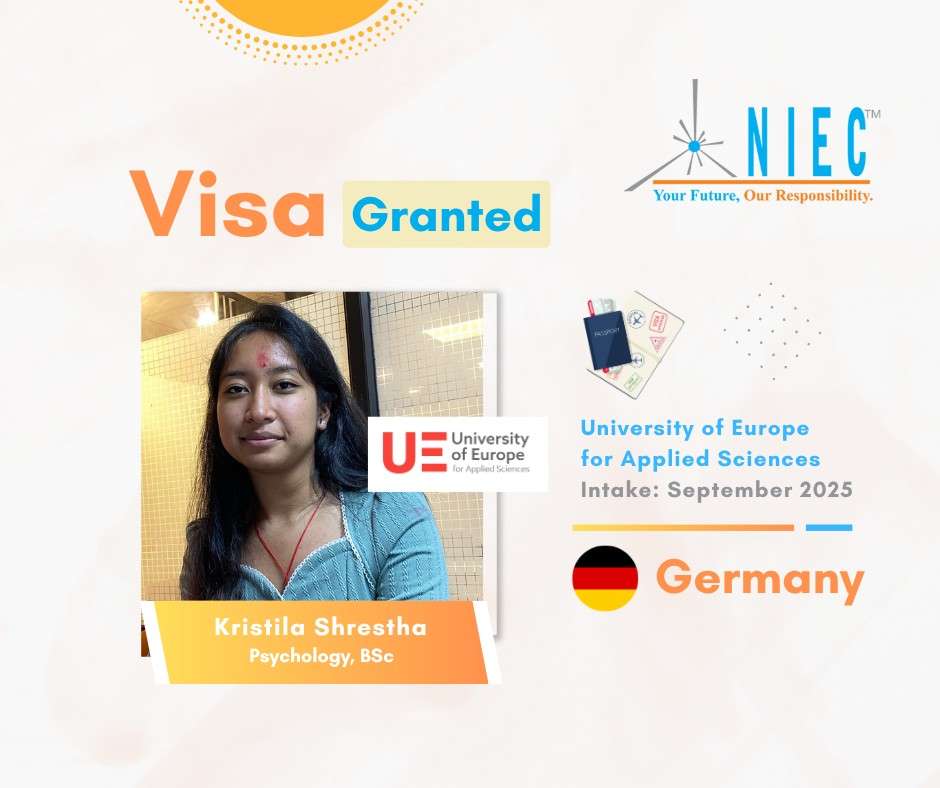
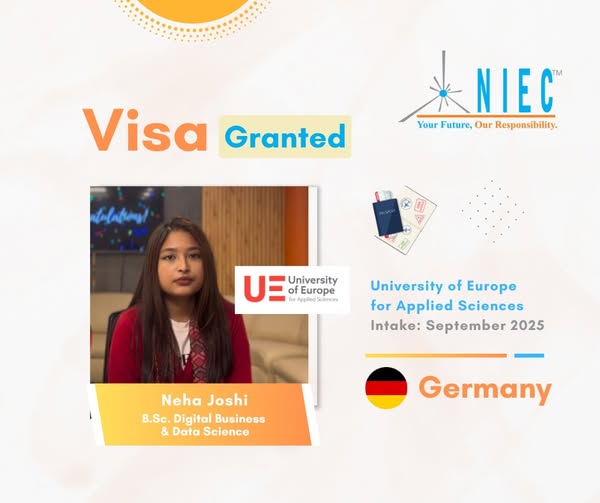
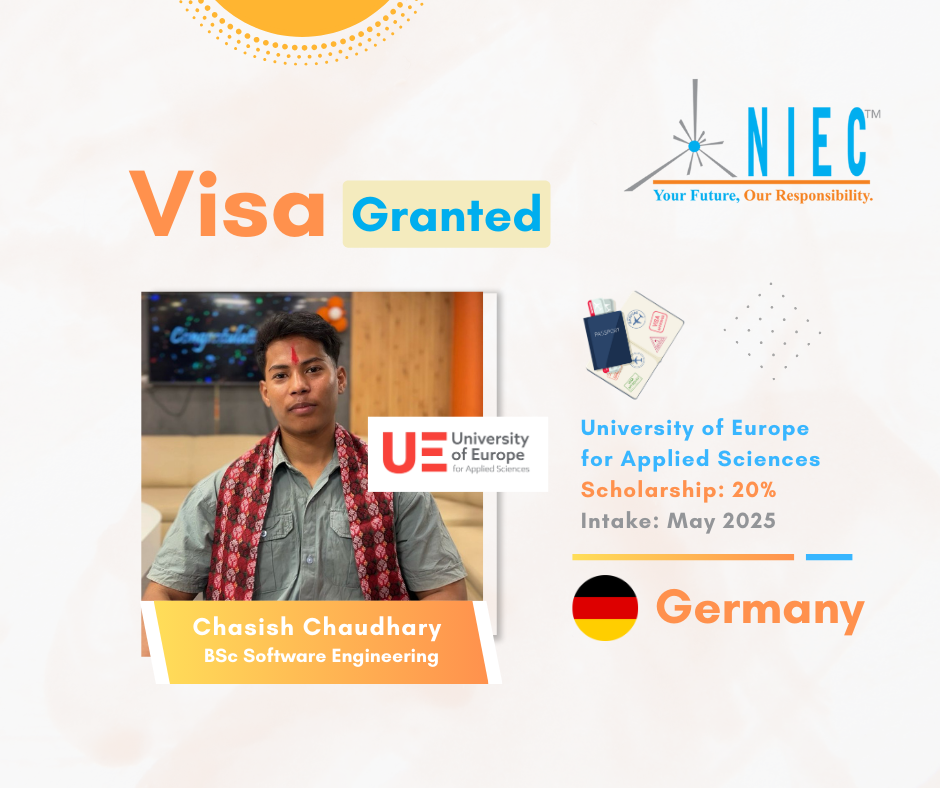
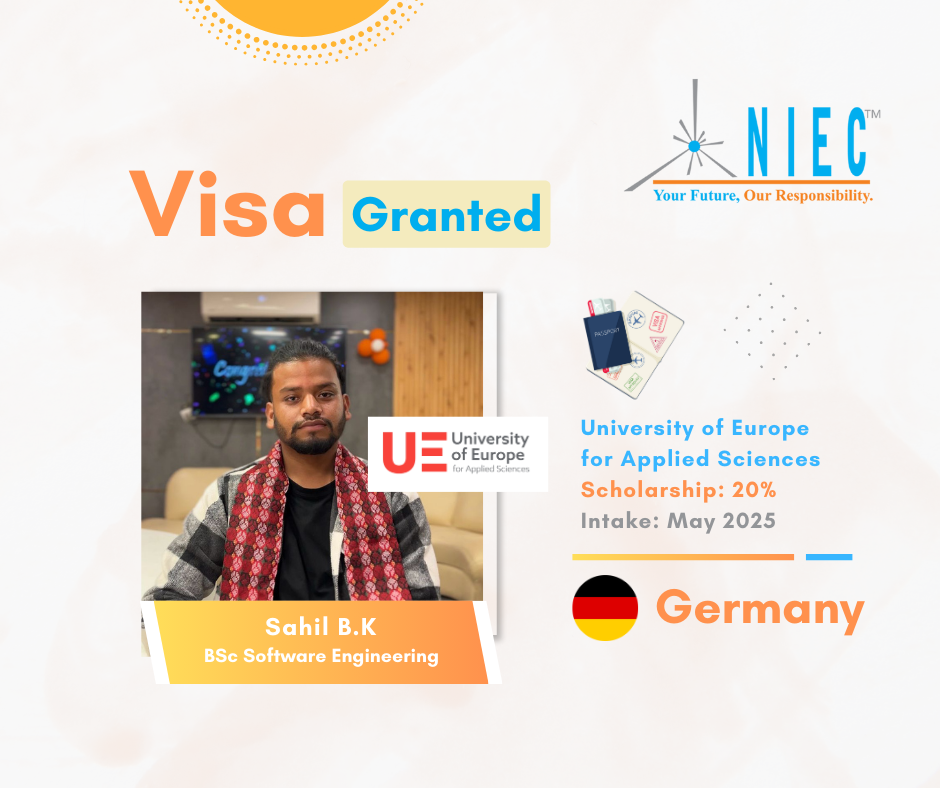
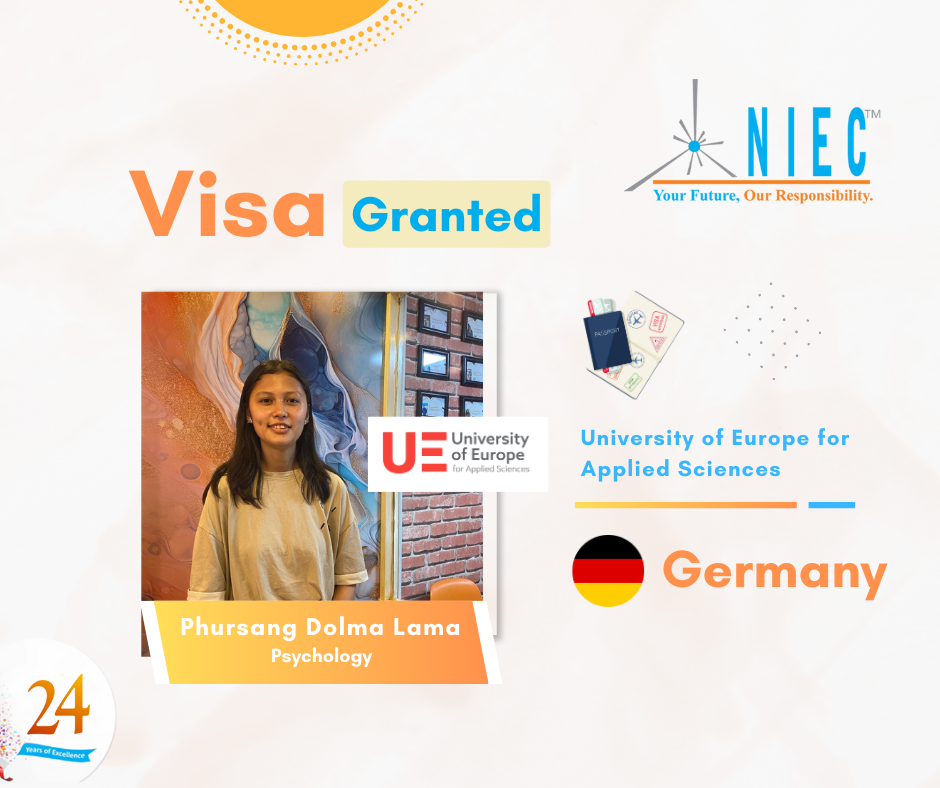
Start Your GERMANY Registration Today!
You could be next! Visit NIEC, one of the best consultancy in Nepal for study in Germany.
1
Education System In GERMANY
Introduction
Germany’s education system is renowned worldwide for its quality, accessibility, and emphasis on both academic and vocational training. It is characterised by a well-structured framework that provides students with a wide range of options tailored to their abilities and interests. Here’s an introduction to the key features of the German education system:

1. Early Childhood Education (Kindergarten):
Early childhood education in Germany is optional but widely attended, typically starting around the ages of 3 to 6. Kindergartens provide a play-based learning environment focused on socialisation, creativity, and early language development. Visit NIEC, one of the best consultancy in Nepal for study in Germany.

2. Primary Education (Grundschule):
Primary education in Germany is compulsory for all children aged 6 to 10, typically lasting four years. The Grundschule curriculum covers a range of subjects, including German, mathematics, natural sciences, social studies, and foreign languages. Visit NIEC, one of the best consultancy in Nepal for study in Germany.

3. Secondary Education:
Secondary education in Germany offers various pathways catering to different academic and career goals. Gymnasium: A type of secondary school typically attended by students aged 10 to 18, leading to the Abitur, which is a university entrance qualification. Realschule: A secondary school offering a more practical education, typically attended by students aged 10 to 16, leading to vocational training or higher education. Hauptschule: A secondary school focusing on basic education and vocational training, typically attended by students aged 10 to 16.

4. Tertiary Education
Germany offers a diverse range of tertiary education options, including universities and universities of applied sciences (Fachhochschulen). Universities offer academic programs leading to bachelor's, master's, and doctoral degrees across various disciplines. Universities of applied sciences provide more practical, industry-oriented programs, also leading to bachelor's and master's degrees.

5. Dual Education System
Germany's dual education system is a hallmark of its vocational training programs, combining classroom instruction with on-the-job training. Vocational training (Ausbildung) programs typically last 2-3 years and are available in fields such as engineering, healthcare, hospitality, and IT. Visit NIEC, one of the best consultancy in Nepal for study in Germany.

6. Research and Innovation:
Germany is a global leader in research and innovation, with numerous universities, research institutions, and technology clusters driving advancements in various fields. Universities collaborate closely with industry partners, government agencies, and international organisations to conduct cutting-edge research and develop innovative solutions.

7. Recognition of Qualifications
German qualifications are widely recognized internationally, facilitating mobility and employment opportunities for graduates. The German Academic Exchange Service (DAAD) and other organisations provide support and resources for international students and researchers. Overall, the German education system offers a comprehensive and well-rounded approach to learning, equipping students with the skills, knowledge, and qualifications needed to succeed in an increasingly globalised world.
Types of Degrees in Germany
In Germany, there are several types of degrees offered at universities and universities of applied sciences (Fachhochschulen), each catering to different academic and professional goals. Here are the main types of degrees available:

1. Bachelor's Degree (Bachelor):
- Duration: Typically 3-4 years.
- Bachelor’s degrees are offered in various fields and disciplines, including arts, humanities, natural sciences, engineering, social sciences, and business.
- The Bachelor’s degree provides a broad foundation in the chosen field and prepares students for entry-level positions in the workforce or further academic study.
2. Master's Degree (Master)
- Duration: Typically 1-2 years.
- Master’s degrees are available in diverse fields and are designed to deepen students’ knowledge and expertise in a specific area of study.
- There are different types of master’s degrees, including:
- Master of Arts (MA): Typically awarded in fields such as humanities, social sciences, and arts.
- Master of Science (MSc): Typically awarded in fields such as natural sciences, engineering, and technology.
- Master of Engineering (MEng): Focused on engineering disciplines.
- Master of Business Administration (MBA): Specialised in business administration and management.
- Master of Laws (LLM): Specialised in legal studies.
- Master’s programs often include coursework, research projects, internships, or a combination thereof. Visit NIEC, one of the best consultancy in Nepal for study in Germany.
3. Doctorate (Doktor):
- Duration: Typically 3-5 years.
- A Doctorate is the highest academic degree awarded by universities and signifies mastery of a particular subject area and the ability to conduct independent research.
- Doctoral candidates work on a research project under the supervision of a professor and must produce a doctoral thesis or dissertation.
- The most common types of doctoral degrees in Germany include:
- Doctor of Philosophy (PhD): Awarded in various academic fields.
- Doctor of Engineering (Dr.-Ing.): Specialised in engineering disciplines.
- Doctor of Medicine (Dr. med.): Specialised in medical sciences.
4. State Examination (Staatsexamen)
- State examinations are specific to certain professions such as law, medicine, pharmacy, teaching, and veterinary medicine.
- These examinations are typically required for entry into regulated professions and are administered by state authorities.
- Successful completion of the state examination is necessary to practice in the respective profession.
5. Diploma:
- The Diploma was a traditional academic degree awarded in fields such as engineering, natural sciences, and economics.
- While less common today due to the Bologna Process reforms, some universities still offer Diploma programs alongside bachelor’s and master’s degrees.
Each type of degree in Germany has its own set of requirements, curriculum, and academic standards. Students can choose the degree path that best aligns with their career aspirations, academic interests, and personal goals. Visit NIEC, one of the best consultancy in Nepal for study in Germany.
Universities,universities of applied sciences ,Colleges of Education and Private Colleges in Germany
In Germany, higher education institutions are diverse and include universities, universities of applied sciences (Fachhochschulen), colleges of education (Pädagogische Hochschulen), and private colleges.
1. Universities (Universitäten):
- Universities in Germany offer a wide range of academic programs across various disciplines, including arts, humanities, natural sciences, engineering, social sciences, and business.
- They focus on theoretical and research-oriented education, preparing students for academic careers, research positions, and leadership roles.
- Universities award academic degrees such as bachelor’s, master’s, and doctoral degrees (PhD). Visit NIEC, one of the best consultancy in Nepal for study in Germany.
2. Universities of Applied Sciences (Fachhochschulen):
- Universities of Applied Sciences emphasise practical, industry-oriented education and training, with a focus on preparing students for professional careers in specific fields.
- They offer programs in areas such as engineering, technology, business, healthcare, social work, and media.
- Programs often include internships, practical projects, and collaborations with industry partners.
- Universities of Applied Sciences award bachelor’s and master’s degrees, as well as some doctoral degrees in specific fields.
3. Colleges of Education (Pädagogische Hochschulen):
- Colleges of Education specialise in teacher training and education-related programs.
- They offer programs for aspiring teachers at various levels of education, including primary, secondary, and vocational education.
- Programs focus on pedagogy, subject-specific teaching methods, educational psychology, and classroom management.
- Colleges of Education award bachelor’s and master’s degrees, as well as teaching qualifications and certifications.
4. Private Colleges (Private Hochschulen):
- Private colleges in Germany are independent institutions of higher education that are privately funded and managed.
- They offer a diverse range of academic programs across different disciplines, often with smaller class sizes and more personalised instruction.
- Private colleges may specialise in specific fields such as business, arts, design, communication, or healthcare.
- Programs at private colleges may have tuition fees, unlike public universities which often offer tuition-free or low-cost education.
- Private colleges award bachelor’s, master’s, and sometimes doctoral degrees, depending on their accreditation and academic offerings.
Overall, Germany’s higher education landscape is characterised by a mix of public and private institutions, each offering unique strengths and opportunities for students pursuing higher education and professional development. Visit NIEC, one of the best consultancy in Nepal for study in Germany.
2
Getting started with Studying in Germany
Learning about the education system, types of degrees offered, different types of universities and colleges will help you have background information on how the education system in Ireland works. However, if you are intending to pursue your higher education, there are a lot of information regarding the admission procedures and immigration that you have to consider. Visit NIEC, one of the best consultancy in Nepal for study in Germany.
Choosing a right University and Course
1. Research and Choose a Program:
- Explore the wide range of academic programs offered by universities and universities of applied sciences in Germany.
- Consider your academic interests, career goals, and preferred study location.
- Research the admission requirements, curriculum, language of instruction, and reputation of the programs you’re interested in.
Admission Process
2. Meet Admission Requirements:
- Review the specific admission requirements for your chosen program, including academic qualifications, language proficiency (usually German or English), and any additional entrance exams or tests.
- If your program requires German language proficiency, consider enrolling in language courses or obtaining a recognized language certificate such as TestDaF or DSH.
3. English Language Requirements
International students are required to submit test scores as proof of English-language proficiency. Caution: “All English-language certificates must have been issued within two years of the expected commencement date of the student’s course.”Generally, the English language requirement for international students in IELTS is a composite score of 6.0 – 6.5 with not less than 6.0 in any one component. Students can also submit PTE scores equivalent to the mentioned IELTS scores. However, it is important to note that universities may have slightly different minimum scores which is why you should check with the International office. Visit NIEC, one of the best consultancy in Nepal for study in Germany.
4. Apply to Universities
- Once you’ve chosen your program, submit your application directly to the university or universities you’re interested in.
- Pay attention to application deadlines, which vary depending on the program and institution.
- Prepare and submit all required documents, including transcripts, letters of recommendation, CV/resume, and a statement of purpose or motivation letter.
5. Secure Funding:
- Explore scholarship opportunities available for international students in Germany. The DAAD (German Academic Exchange Service) offers various scholarships for international students at all levels of study.
- Consider other sources of funding, such as grants, fellowships, student loans, or savings. Visit NIEC, one of the best consultancy in Nepal for study in Germany.
6. Apply for a Student Visa:
- If you’re a non-EU/EEA citizen, you’ll need to apply for a student visa to study in Germany.
- Contact the German embassy or consulate in your country to learn about visa requirements and the application process.
- Be prepared to provide proof of acceptance to a German university, sufficient financial means to cover living expenses, health insurance, and other required documents.
7. Arrange Accommodation:
- Start looking for accommodation options in your chosen study city well in advance.
- Universities often provide assistance or resources for finding student housing, such as dormitories or shared apartments.
- Consider your budget, location preferences, and amenities when choosing accommodation.
8. Scholarships in Germany
International students who are eligible are offered scholarships at Germany universities which includes various scholarships like government of Germany Scholarship, scholarships awarded by individual institutions or another organisation. These scholarships are available at most levels of study and are awarded solely at the discretion of the individual organisations that set their own criteria for eligibility. It is best if students contact the institution or organisation of their choice directly in order to obtain more detailed information on the scholarships offered. You can find the list of scholarships offered to international students on the Education in German website. Visit NIEC, one of the best consultancy in Nepal for study in Germany.
9. Prepare for Your Arrival:
- Plan your travel arrangements and arrival in Germany.
- Familiarise yourself with German culture, customs, and basic phrases in German.
- Set up a German bank account, obtain health insurance coverage, and register your address with the local authorities (Anmeldung) upon arrival.
10. Get Settled and Enjoy Your Studies:
- Attend orientation events and welcome sessions organised by your university.
- Explore your new city, connect with fellow students, and immerse yourself in the academic and cultural experiences Germany has to offer.
- Take advantage of student services, facilities, and extracurricular activities available at your university.
By following these steps and staying organised throughout the process, you’ll be well-prepared to begin your studies and make the most of your time in Germany.
Apply to Study in Germany
Living Cost in Germany
Your living costs in Germany will vary depending on where in Ireland you are studying, the type of accommodation you choose as German offers wide choices in terms of accommodation. Students can either choose to live on campus which is generally more expensive. Or, they can choose to stay off-campus where they can either opt for rented accommodation or stay with host families. Your living costs will also depend on your personal lifestyle however, as per the estimation in the Education in German website a student will require€11,000 – €13,000 on average per year to cover their living costs. Visit NIEC, one of the best consultancy in Nepal for study in Germany.
Immigration and Visas
The visa application process and visa conditions for international students are equally important to explore if you are seeking to study in Germany.
How can I apply for a student/study visa?
The process to get a visa for Germany in Nepal varies depending on your individual circumstances. However, you can take a few general steps regardless of the circumstances. Some of the key steps you can take to get a visa for Germany in Nepal are as follows:
- Determine the purpose of the visit
- Prepare the documents based on the visa type.
- Go to the German embassy in Nepal and fill out the online application with accurate details.
- After submitting the form, schedule an appointment for your visa interview at German Embassy
- Submit your biometrics and digital photograph as a part of the biometric data collection at the visa centre
- After the interview, the next phase is to wait for the processing, which usually takes 10 to 15 days.
- Collect the password once the visa is approved. The stamp would then be ready for collection at the application centre.
- Make travel arrangements and book your flights and hotel with the visa validity dates.
Germany is one of the most popular education destinations for students of Nepal. Therefore, many students wish to visit Germany. That said, before visiting Germany, you require a German visa. However, some of you may ask – what are the German visa requirements from Nepal? Here, we cover all you need to know about German visas from Nepal! Visit NIEC, one of the best consultancy in Nepal for study in Germany.
Who can Apply for a German Visa in Nepal?
There are several criteria for who can apply for a German Visa in Nepal. Some of the key details regarding who can apply for a German visa in Nepal are as follows:
- Nepali citizens who want to travel to Germany for tourism, business, study, and family visits can apply for a German visa at the German embassy.
- Foreign nationals residing in Nepal on a valid Nepali visa.
- Minors under 18 years, with the consent from their parents or legal guardians
- Students planning to study in Germany.
- For business visits, as long as you have the invitation letter from a German company
.
Documents Required for a German Visa in Nepal
The documents required for a German visa in Nepal will vary depending on your specific circumstances. Regardless, we can provide you with a list of key documents. The key documents required for a German Visa from Nepal are as follows:
- Valid passport
- Birth Certificate
- Biometric passport photograph
- Signed declaration on true and complete information
- Copy of your passport’s data page and last page
- Original citizenship certificate
- Letter of motivation
- Proof of admission
- School-leaving certificate
- Higher Secondary Education Board certificate
- Proof of previous studies
- Proof of German language knowledge
- Proof of financial means
- Along with this, you also need to open a blocked account.
What is a Block Account in Germany?
A block account in Germany is a special bank account that is required by the German authorities. Although a locked account, Sperrkonto, is not mandatory, at the time of application, it may be requested during the visa application process. They are used to show the financial stability of international students who aim to study in Germany. The money deposited is in your name. However, you cannot access all the blocked account amounts in Germany at once. You receive a monthly allowance in your regular bank account in the German bank.
You will receive a “blocking confirmation” from the organisation you select for the account opening as soon as you deposit the required block account amount for Germany. A blocking confirmation is a document you must submit to the authorities along with your visa as proof of your financial capability.
As per the German Federal Foreign Office, you must deposit a minimum of €11,208 to apply for a German study visa. That said, this is only the minimum required block amount for Germany 2024. You can deposit more than this stated Germany blocked account amount of 2024 during the blocked account opening for your studies in Germany.
As mentioned, the German block account is one of the required financial documents for the visa. Therefore, you are generally in Nepal when opening a blocked account. So, to open the blocked account, you can follow the process below:
- Check with the German embassy or a trusted German education consultancy like Edu Zeit to determine how much money you need to open the account.
- Open a blocked account with the blocked account provider of your choice. That said, some German banks offer you options to open the blocked account directly. However, you must submit a paper application via email through the German embassy to do this.
- Wait for the application to process
- The provider will send you your International Bank Account Number (IBAN).
- Once you get the bank account, you can transfer the required Germany block amount through an international money transfer service. This process lasts roughly three to five days.
- Get confirmation from the bank.
- Wait to receive the visa. Visit NIEC, one of the best consultancy in Nepal for study in Germany.
How long can I stay in Germany with a study visa?
In Germany, the duration of stay permitted on a study visa also depends on various factors such as the type and duration of your study program. Typically, if you’re enrolled in a full-time university degree program, the study visa allows you to stay for the duration of your studies, including any preparatory language courses if required.
However, it’s essential to note that if your program lasts longer than one year, your visa may initially be issued for one year, and you may need to extend it before it expires. You can extend your residence permit in Germany as long as you meet the requirements, such as maintaining enrollment in your program and demonstrating sufficient financial means to support yourself.
As visa regulations may change and vary based on individual circumstances, it’s advisable to check the specific details with the German embassy or consulate in your country or with the relevant immigration authorities in Germany. They can provide you with accurate and up-to-date information regarding study visa durations and requirements. Visit NIEC, one of the best consultancy in Nepal for study in Germany.
3
Making your journey to Germany - a checklist
Preparing for your journey to start your student life in Germany is an essential part where you have to learn about what you have to pack or carry and things you can expect when you finally get to Germany.
Packing your bags
The weather in Germany is not extreme however, it does have wet weather sometimes and it can feel cold. Students should pack some rain-resistant clothes and maybe boots and a few sweaters. Meanwhile, in the summertime just shorts and t-shirts are the outfit of choice. In the span of just one day, it can feel warm or cool depending on what hour it is henceforth, students need to prepare themselves for any kind of weather. Other essentials are your important documents, some souvenirs from the home country and essential electrical items. Visit NIEC, one of the best consultancy in Nepal for study in Germany.
Documents to carry
It is very important that students carry with them the right documents that will allow them to enter and remain in Germany. Some of the important documents include your passport, student visa, acceptance letter from the university or institution, your official academic transcripts from the schools previously attended, English proficiency certificate, immunisation and medical records, your driving licence if you have one, medical insurance and some cash. Visit NIEC, one of the best consultancy in Nepal for study in Germany.
Landing at the airport
It is important that you immediately report to an immigration officer at the border control when you get to the airport in order to enter Germany. You should have your important documents handy so that you are able to provide it to the immigration officer in order to explain your visit. Important documents include your passport and visa. You could also be asked for some other documents like your acceptance letter, evidence of tuition fees paid, health insurance or details of your accommodation. Once you enter the country, it is important that you register with the immigration before the date stamped on your passport at the border control. Visit NIEC, one of the best consultancy in Nepal for study in Germany.
How to get to your university from the airport?
Students who arrive at night must in advance arrange for their accommodation to stay at a hotel for one night in order to ensure they have a good and a safe place to stay at night. Many hotels will provide a free shuttle bus trip to and from the airport henceforth, it is suggested that students enquire with the hotels when booking.
Depending on the accommodation type, students can phone their homestay providers for pick-up, look for a campus orientation/ international student liaison who will take you to where you are staying or maybe just take a taxi or bus to the homestay, dormitory, or off-campus housing. It is important that your travel be arranged in advance. Visit NIEC, one of the best consultancy in Nepal for study in Germany.
4
Starting your student life in Germany
Starting your student life in Germany can be an exciting and enriching experience. Here are some tips to help you make the most of it:
Orientation programs
Attend any orientation programs or events organised by your university. These can help you get acquainted with the campus, meet fellow students, and learn about important resources and services available to you.
Language skills
If you’re studying in German, continue to improve your language skills.Consider joining language exchange programs, language courses, or conversation groups to practise and enhance your proficiency. Visit NIEC, one of the best consultancy in Nepal for study in Germany.
Socialise and Network
Make an effort to socialise and connect with other students, both international and local. Join student clubs, organisations, or sports teams to meet people with similar interests and expand your social circle.
Explore the Culture
Immerse yourself in German culture by exploring local festivals, events, museums, and landmarks. Embrace new experiences and be open to learning about the customs and traditions of your host country.
Budget Wisely
Manage your finances prudently to ensure you can cover your living expenses throughout your studies. Take advantage of student discounts, cook meals at home, and consider part-time work opportunities if permitted by your visa. Visit NIEC, one of the best consultancy in Nepal for study in Germany.
Academic Support
Familiarise yourself with the academic support services offered by your university, such as tutoring, writing centres, and academic advising. Don’t hesitate to seek help if you encounter challenges with your coursework. Visit NIEC, one of the best consultancy in Nepal for study in Germany.
Stay Healthy
Prioritize your physical and mental well-being. Maintain a balanced diet, exercise regularly, and seek support from campus health services or counselling centers if needed.
Travel and Explore
Take advantage of your time in Europe to travel and explore other cities and countries. Germany’s central location makes it easy to visit neighbouring countries and experience different cultures and landscapes.
Participate in Cultural Exchange
Share your own culture with others and engage in cultural exchange activities. Attend international nights, language cafes, or cultural workshops to celebrate diversity and foster cross-cultural understanding. Visit NIEC, one of the best consultancy in Nepal for study in Germany.
Stay Organized
Stay organised with your studies by creating a schedule, setting goals, and managing your time effectively. Keep track of assignment deadlines, exam dates, and other academic responsibilities to avoid last-minute stress. Visit NIEC, one of the best consultancy in Nepal for study in Germany.
Embrace Independence
Embrace the opportunity to become more independent and self-reliant. Take initiative in managing your affairs, such as accommodation, finances, and personal development.
Stay Informed
Stay informed about important updates and developments, both within your university and in Germany as a whole. Subscribe to newsletters, follow social media channels, and attend information sessions to stay up-to-date.
By embracing these tips and actively engaging in your student life in Germany, you can make the most of your experience and create lasting memories. Enjoy this exciting chapter of your academic journey!
5
Settling in Germany
Settling into life in Germany involves several steps to ensure a smooth transition and integration into your new environment.
Residence Registration (Anmeldung):
Within a few days of arrival, you need to register your address at the local registration office (Einwohnermeldeamt or Bürgeramt). This registration is mandatory and will provide you with a residence registration certificate (Meldebescheinigung).
Bank Account
Open a bank account in Germany to manage your finances. Research different banks and their offerings, and choose one that suits your needs. Having a German bank account will make it easier to pay rent, bills, and other expenses.
Health Insurance
Ensure you have health insurance coverage in Germany. If you’re under 30 and enrolled in a public university, you may be eligible for statutory health insurance (gesetzliche Krankenversicherung). Otherwise, you’ll need to arrange for private health insurance or prove that your existing insurance meets German requirements.
Legal Obligations
Familiarise yourself with important legal obligations, such as visa requirements, residency rules, and tax responsibilities. Stay informed about any updates or changes to immigration laws and regulations.
Rules for International Students Working in Germany
As we mentioned, the key focus you should have as an international student is studying. However, if you want to work in Germany as an international student, you can. The only catch is that you have to follow some specific rules. They are as follows:
- You can only work for 20 hours a week. You must contribute to Germany’s Social Security fund if you work more than 20 hours a week.
- As an international student, you can work only for 120 Full days or 240 Half days per year. A full working day is 8 hours, and a half working day is 4 hours per day. This includes internships as well, even if they are unpaid.
- If you want to work more than the stated hours, you must get permission from the local employment agency and foreign registration office.
- You are not allowed to take self-employment or freelancing.
- You can hold a minijob and earn up to 538 Euro per month without taxes.
- If you regularly earn more than 538 Euro per month, you will need a tax number and a specific amount will be taken from your earnings each month. You can get this money back at the end of the year by submitting a tax return.
Note* If you work as an academic assistant, you generally do not have to follow the working hours limit. However, you still need to know foreigners about your specific circumstances.
Germany introduced a system of minimum wage back in 2015. Since January of 2024, the minimum wage in Germany is 12.41 Euro per hour. However, the specifics will vary depending on your industry, and regional labour market.
Paying Taxes in Germany
You do not need to pay taxes if your income is equal to or under €538. However, you must pay the taxes if your income exceeds this amount.
.
Getting EU blue card in Germany
The EU Blue Card is a special work and residence permit for highly skilled non-EU/EEA citizens in Germany. It requires a job offer with a salary above a certain threshold. With the EU Blue Card, you can live and work in Germany for up to four years, with benefits like family reunification and a path to permanent residency.
Frequently Aksed Questions
Studying in Canada as an international student requires you to apply a university that suits your best. With your acceptance letter, you can then apply for your study permit.
The average tuition fees for an international undergraduate student is CA$29714 per year and the average tuition fee for international students is CA$17,774.
The application fee for university admission ranges from CA$100 to CA$250 on average depending upon the institution. There are also universities that you can apply to without any application fee.
Selecting your university requires you to look at various study options. The major factors include your study interest, location you want to study in Canada, course fees, scholarships and university requirements. However, in order to get your study permit it is important that you have an acceptance letter from a designated learning institution (DLI).
In case you only receive a conditional acceptance letter, you will need to provide any additional documents or information requested by your university.
In order to process for your study permit, you will require paying your fees in advance. Universities generally require you to pay the fees for one year. You will have to accept your offer and make the fees payment to confirm your enrolment in Canadian Universities.
It is mandatory for international students who have English as their second language to submit their English language proficiency certificate to meet the English language requirements. Canada offers education in both English and French language.
Students will require an overall score of 6.5 or equivalent with not less than 6.0 in each band to apply for undergraduate or graduate courses. The score requirements could vary depending on the course and university.
There are various scholarships programs and financial aids offered to international students. It is important to check the university website and apply as early as you can as the scholarships are highly competitive. Students should also conduct research about other scholarships offered by various organizations and government in Canada.
It is essential that students provide proof of finances to fund their studies and stay in Canada. Financial documents like bank balance certificate, bank statement, and affidavit of support are essential. Students can also process for student loan from an accepted bank.
International students with study permit are allowed to work up to 20 hours per week during regular academic sessions and can also work full time during breaks.
Study permit is a document issued to international students to study at a designated learning institution(DLI) in Canada. You can apply for your study permit once you get your acceptance letter from your university.
Please note that your study permit is not your visa and you will also need a visa as yourstudy permit will not allow you to enter Canada. Nepalese student require a Temporary Resident Visa (TRV). You will be automatically issued with your TRV if your application for study permit is approved. You will not require a separate application or fees for it.
Canadian universities generally offer three intakes: Fall Semester (starts in September), Winter Semester(starts in January) and Summer Semester (starts in April/ May and is available only for limited programs). It is suggested that you apply minimum 6 to 9 months prior to the application deadline.
It takes up to 8 weeks to get your study permit once you submit your application. You could be asked for additional document or information if required.
On average, CA$10,000- CA$12,000 would be required per year to cover your living costs in Canada. You will also need to purchase a compulsory health insurance whichcostsapproximately CA$600- 800 per year.
Your visa is an authorization to enter into Canada while, a Study Permit is the authority to stay and study in Canada.When your Study Permit is approved, you will also receive a Temporary Residence Visa(TRV). The government of Canada does not really issue a “Student Visa”.
After you complete your graduation, you may be eligible to work temporarily or settle permanently in Canada.You have a time frame of 180 days after getting your final marks to apply for your Post-graduation Work Permit (PGWP). Canada also allows international students will Canadian work experience to apply for permanent residency.
You can give your biometrics if you have submitted paper application and have booked an appointment. For online application, you have to wait for the biometric instruction letter.
Universities might request for an interview in order to issue the letter of acceptance. You could also be required to give an interview during your application process for a study permit.
Yes, you can apply along with dependent while you are applying for your study permit however, it is important that you show proof of finances to fund your partner's stay in Canada and your spouse should meet all the requirements for temporary residence in Canada.
Your spouse can be eligible to apply for a spousal open work permit which will allow him/her to work full-time for the same period as their partner's study permit. However, if your partner is interested to study in Canada, it is required that he/she applies for a separate study permit.
International students are required to arrange for health insurance during their study period in Canada. The health care system depends on the province of study as some provinces cover international students under provincial health insurance plans while majority of provinces require international students to register for private health insurance plans. Generally, your university will offer health insurance packages.
Students have the options to either live on-campus or off-campus depending upon their choice. International students generally opt to live on campus as it allows them to live with their peers. It helps them build networks and friendships that will eventually help them adjust to their new student life.
International students can apply for a study permit extension if they wish to continue studying for longer than the validity period of their existing study permit. You can simply submit an application to Immigration, Refugees and Citizenship Canada (IRCC) website.
International students who have completed full-time studies in Canada in a program of at least 8 months can apply for a PGWP however, it is important that you have completed your studies at a Designated Learning Institution (DLI). You have to apply within 180 days of the completion of your study program. You can apply for a PGWP only for once.
The Canadian Experience Class (CEC) under Express Entry allows international students who have Canadian work experience to apply for permanent residency status.






















